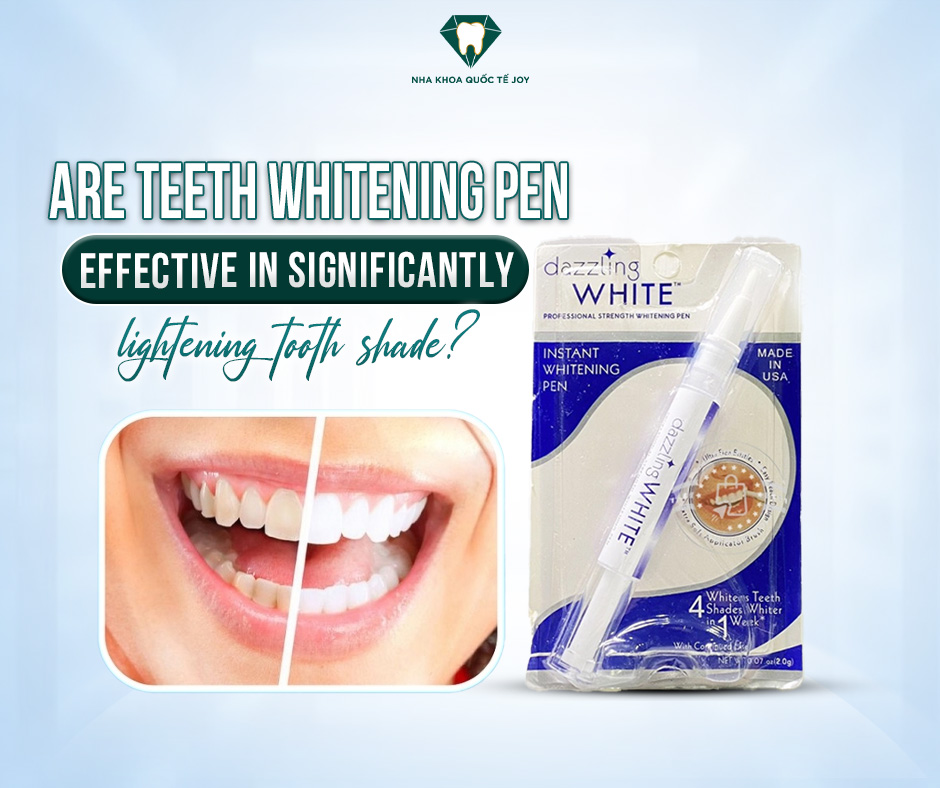In today’s fast-paced world, balancing work and personal life can leave little time for extensive dental appointments. If you’re looking to brighten your smile but find it challenging to visit the dentist for professional whitening, you’re in luck. Modern technology has provided several at-home teeth whitening methods, with teeth whitening pens being a particularly popular option. But do these pens truly deliver the desired results? Let’s Joy International Dental Clinic explore this method in detail.
1. What is a Teeth Whitening Pen?
A teeth whitening pen is a portable oral care product designed in a compact pen-like form. This pen contains a whitening gel, typically composed of active ingredients such as hydrogen peroxide or carbamide peroxide. These are similar to the components found in professional whitening products but at a lower concentration, making them suitable for at-home use.
The pen is equipped with a brush or soft-tipped applicator, allowing for easy and direct application of the gel onto the tooth surface. The primary goal of a teeth whitening pen is to improve the appearance of teeth stained or discolored by various factors, including food and beverages (such as coffee, tea, and red wine), tobacco use, and natural aging.
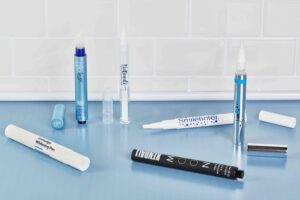
2. How Effective are Teeth Whitening Pens?
The effectiveness of teeth whitening pens depends on several factors:
- Concentration of Whitening Agent: A higher concentration of peroxide generally leads to more pronounced whitening. However, it also increases the risk of tooth sensitivity if not used correctly. It’s crucial to follow the manufacturer’s instructions and consult with a dentist if you have sensitive teeth.
- Severity of Staining: Teeth whitening pens are usually most effective for mild to moderate surface stains. For severe intrinsic staining (caused by factors like tetracycline antibiotics or fluorosis), these pens may not provide the desired results. Professional whitening treatments are often necessary for these types of stains.
- Oral Health: If you have sensitive teeth or existing oral health issues such as gum disease or cavities, it’s essential to consult with your dentist before using a whitening pen. This will help you avoid potential side effects and ensure the whitening process is safe for your specific situation.
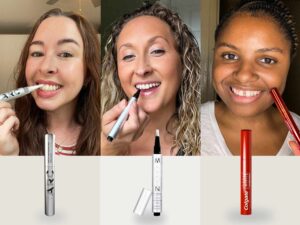
3. Advantages and Disadvantages of Teeth Whitening Pens
3.1 Advantages:

- Convenience and Ease of Use: The most significant advantage of teeth whitening pens is their portability and ease of use. Their compact design allows you to carry them with you and use them virtually anywhere, anytime. The application process is also straightforward, typically taking only a few minutes.
- Time-Saving: Applying the gel takes just a few minutes, making it a convenient option for busy individuals. You can easily incorporate it into your daily routine.
- Cost-Effective: Compared to professional in-office whitening treatments or custom-made whitening trays, teeth whitening pens are a more affordable option, making them accessible to a wider range of people.
- Targeted Application: The small brush or applicator tip allows for precise application of the gel to specific stained areas, avoiding unnecessary contact with other teeth or gums. This is particularly useful if you only need to whiten a few specific teeth.
- Maintenance: Teeth whitening pens can be a great way to maintain the results of professional whitening treatments, helping to prolong the brightness of your smile.
3.2 Disadvantages:
- Limited Effectiveness: Compared to professional dental whitening, the results of teeth whitening pens are often less dramatic and may not last as long. They primarily target surface stains and may not be effective for deep or intrinsic stains.
- Potential for Sensitivity: The whitening gels in these pens, even at lower concentrations, can still cause tooth sensitivity, especially for individuals with sensitive teeth or weakened enamel.
- Uneven Whitening: Applying the gel evenly across the tooth surface can be challenging, potentially leading to uneven whitening results. Careful application and following the instructions are crucial.
- Not a Substitute for Oral Hygiene: Teeth whitening pens should not replace regular oral hygiene practices. Brushing at least twice a day, flossing daily, and using mouthwash are still essential for maintaining good oral health.
4. How to Use a Teeth Whitening Pen
To use a teeth whitening pen effectively and safely, follow these steps:
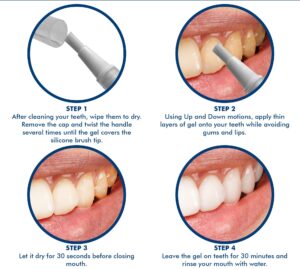
- Clean Your Teeth: Brush and floss thoroughly to remove any plaque or food particles.
- How to Use a Teeth Whitening PenDry Your Teeth: Use a clean paper towel to dry the surface of your teeth. This will help the gel adhere better.
- Apply the Gel: Gently twist the bottom of the pen to dispense the gel.
- Coat Your Teeth: Apply a thin layer of gel to the surface of your teeth, avoiding contact with your gums.
- Keep Your Mouth Open: Keep your mouth open for the recommended time (usually 1-2 minutes) to allow the gel to dry.
- Rinse: Rinse your mouth thoroughly with water.
Always refer to the specific instructions provided with your chosen product, as the application time and frequency may vary.
5. Important Considerations When Using Teeth Whitening Pens
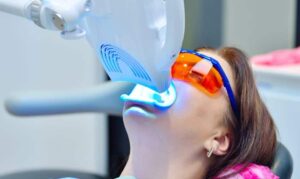
- Avoid Overuse: Using the pen too frequently can lead to tooth sensitivity and enamel erosion. Stick to the manufacturer’s recommended usage guidelines.
- Avoid Gum Contact: The whitening gel can irritate your gums if it comes into direct contact. Apply the gel carefully and precisely.
- Consult Your Dentist: If you have sensitive teeth, existing oral health problems, or are using other whitening products, consult your dentist before using a teeth whitening pen.
- Choose Reputable Products: Purchase products from reputable brands and retailers to ensure quality and safety. Avoid purchasing counterfeit or low-quality products that could be harmful.
Conclusion
Teeth whitening pens offer a convenient and relatively affordable way to brighten your smile at home. They can be particularly effective for maintaining the results of professional whitening treatments or addressing mild surface stains. However, they have limitations and are not a substitute for proper oral hygiene or professional dental care. If you have any concerns about your oral health or the suitability of teeth whitening pens for your specific needs, consult with your dentist for personalized advice. You are welcome to visit Joy International Dental Clinic for a free consultation.

